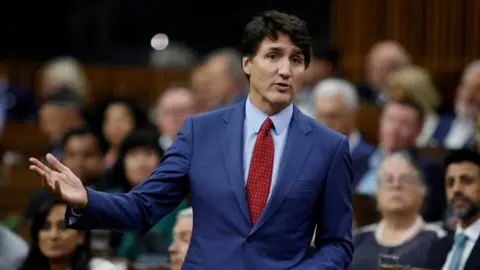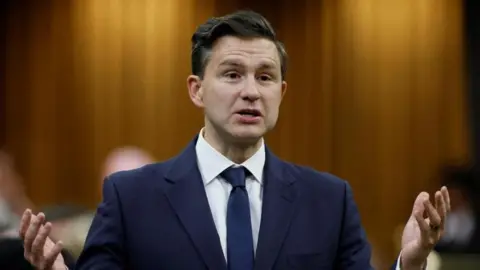Canada’s Trudeau survives no-confidence vote in parliament
 Reuters
ReutersCanadian Prime Minister Justin Trudeau has survived a motion in parliament aimed at bringing down his government and triggering an election.
Wednesday’s no-confidence vote is the first in a series of similar votes expected to be put forward by the opposition Conservative Party amid Trudeau’s plummeting approval ratings.
The motion failed after opposition leader Pierre Poilievre fell short in his effort to shore up support from leaders of two other political parties in parliament, the New Democratic Party (NDP) and the Bloc Québécois.
Trudeau, who has been Canada’s prime minister for nine years, has been leading under a minority government.
Voting was held on Wednesday afternoon, on the same day as Trudeau was set to host French President Emmanuel Macron.
While this motion has failed, the Conservative party plans to bring at least two other similar no-confidence votes on Thursday in hopes of sending Canadians to the polls.
Trudeau has been facing growing pressure to step down in recent months.
His approval rating has plummeted from 63% when he was first elected to 28% in June of this year, according to one poll tracker, amid concerns about housing unaffordability and the rising costs of living. His Liberal party lost two consequential by-elections this summer in Toronto and Montreal.
A deal between his party and the NDP has helped him stay in power since Canada’s last federal election in 2021.
But the deal collapsed early in September after NDP leader Jagmeet Singh pulled out from the coalition, saying that the Liberals are “too weak” and “too selfish” to govern.
Trudeau’s leadership has been under threat since, with Conservative Party leader Pierre Poilievre stating that he would put forward a no-confidence vote.
The vote would need the approval of the majority of the 338 members of parliament (MPs) in order for it to pass.
The Liberal Party, which holds 153 seats, voted against it, while the Conservative Party, which holds 119 seats, voted in favour.
The bulk of the other seats are held by the NDP and the Bloc Québécois – both of whose members voted to defeat the motion.
In the end, the motion was defeated by 211 votes against it.
 Reuters
ReutersPierre Polievere, who has been leading in various national polls, had urged fellow MPs to vote in favour of the motion by outlining his vision for Canada under a Conservative government.
His plan, he said on Tuesday in parliament, is “to bring home the promise of Canada, of a powerful paycheque that earns affordable food, gas and homes and safe neighbourhoods”.
But Singh, the NDP leader, said he would vote against Poilievre’s motion because he believes the Conservative Party will cut social programmes like dental care and pharmacare if it comes to power.
The Bloc Québécois – a party whose aim is to represent the interests of Quebec, Canada’s French-speaking province – has said it believes it could work with the Liberal government to secure assurances for Quebec-focused social programmes.
Trudeau was at the UN General Assembly earlier this week in New York City, where on Monday he appeared as a guest on the Late Show with Stephen Colbert.
In his interview with Colbert, Trudeau acknowledged that Canadians were going through “a really tough time” and struggling to afford gas, groceries and rent.
But he defended his leadership, saying that his government had invested in Canadians and would continue to do so.
“I’m going to keep fighting,” he said.







